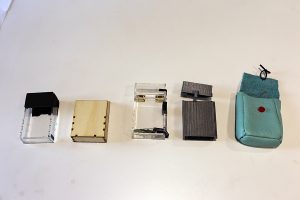
Rev Hardware Accelerator Team Packs a Punch to Smoking
Rev’s summer Hardware Accelerator is in the middle of Sprint 3, the phase in which member teams work towards prototyping their product ideas. Teams are engaging in one-on-one work with mentors and technical instructors, as well as collecting insight from successful local hardware-based startups. As the teams work toward their final product concepts and prepare for Demo Day on August 11th, we’ll be sharing profiles of them and the story of their progress.
Everything is “smart” these days – our phones, our cars, our watches – all in the name of making our lives simpler, easier, healthier. It’s an effort that builds the Internet of Things – a network of physical objects that we’ve developed into devices that collect and exchange data. 2016 Rev Hardware Accelerator team StopPack has spent the past few months developing the next smart thing: cigarette packs.
In actuality, StopPack is an electronic case for cigarette packs that provides a chemical-free, social alternative to common smoking cessation methods. It tracks the user’s habits — from how frequently they open their packs to their most vulnerable time of day — and organizes the data in an app. The app gives the user a range of tools, goals, and encouragement to support their goal of quitting. “We looked into methods that are already out there and what was working,” recalls team member Alex Horner of their concept development, “While there are social platforms that help people quit, there isn’t any hardware that gives people this kind of in-depth data.”
Alex, a rising Ithaca College senior, met team members Sethavatey Limsreng and Aniebietabasi Ekong in an entrepreneurship class at Ithaca College. The class — taught by Rev Entrepreneur-in-Residence Brad Treat — centered on developing a great business idea and attracted students from all majors, which is how StopPack came together. “None of us are engineers – we’re business and math and arts,” Alex says of his team members, “Before we got into this, we were thinking ‘oh, sure, we’ll just throw our product together and market it’, thinking strictly from a business perspective. Now we know much more about the development side of things.”
At the culmination of Brad’s course, the StopPack team entered a local Business Plan Competition. Unfortunately, their hopes of winning the $20,000 prize money went up in smoke; at the time, the team explains, they had little hardware developed and had completed no customer validation. The three collaborators still felt StopPack was worth pursuing, and at Brad’s encouragement, the team joined the 2016 Hardware Accelerator program.
“Once we got here, each new hurdle – be it programming our chip, finding an app developer, 3D printing or laser cutting – was a new challenge,” says Sethavatey. “We’re so grateful to have learned it all,” she adds, noting that the team has a much more realistic sense of how they’re turning their product into a business.
The team continues to receive support from Brad, who has pushed them to go out and talk to potential users. “We’ve talked to hundreds of people now,” says Alex, “from people who currently smoke to people who’ve successfully quit, to people in addiction support groups like Alcoholics Anonymous and respiratory therapists.” The team plans to take their prototype into the field in the coming months in anticipation of getting StopPack onto the market.
What will StopPack’s next move be? The team intends to take their product to the medical community with the hope of receiving a government grant to support further development. To see StopPack in action, join us on August 11th for Demo Day. For more information about the Hardware Accelerator Program and its 2016 teams, click here.

